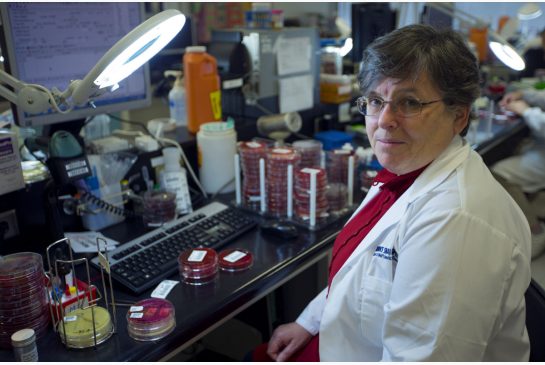Mount Sinai Hospital’s Director of Infection Control Dr. Allison McGeer joined the World Health Organization in October to help battle the virus, which has killed 3,400 people in Liberia since May.

CHRIS SO / TORONTO STAR Order this photo
Dr. Allison McGeer at the microbiology lab at Mount Sinai Hospital where she is the director of infection control. She just flew in from Liberia last night and will go back to Liberia on Sunday where she works with the World Health Organization on coronavirus and ebola containment strategies.
Dr. Allison McGeer knows how daunting facing the outbreak of a fatal virus head on can be.
She navigated Toronto’s six-month SARS crisis in 2003 as both the Director of Infection Control at Mount Sinai Hospital and a consultant on infection control at Scarborough Grace Hospital.
By the time the second wave of Severe Acute Respiratory Syndrome cases erupted in mid-May of that year, McGeer and her staff had been fighting the outbreak day and night for about two and a half months.
Exhausted and desperate for help, the microbiologist placed tear-filled calls to colleagues around the world.
“I picked up the phone, called people and said, ‘Please can you come and help?’ Everybody came. People dropped things and appeared. It was just miraculous.”
It’s the willingness to help McGeer experienced during the SARS crisis that inspired her to submit her resume when the World Health Organization put out a call in late June asking healthcare workers to travel to West Africa to battle the ongoing Ebola virus crisis.
WHO asked McGeer to travel to Liberia in late September. She arrived 10 days later, and has since spent about eight weeks in the disease-ravaged country. Her last stint, a three week trip, ended Sunday. Seven days later she’ll return for a short stay, filling in for a fellow infection prevention and control worker until the middle of January.
Liberia has dealt with a total of 8,000 suspected, probable and confirmed cases and 3,400 deaths since the “completely unexpected” outbreak occurred in late May, McGeer said. Now, about 5 new cases are suspected each day.
But the country is doing relatively well compared to two its neighbours, Guinea and Sierra Leone, she said. Current projections show Liberia is on track to get rid of all indigenous cases by May or June.
“That’s still going to require a lot of work and a considerable amount of good luck, but generally speaking things are getting better. They’re going in the right direction.”
Outbreaks are big, messy and chaotic, McGeer said.
“You’re going into a situation in which there are a lot of really good people, there’s just not enough of them,” she said. “Everybody is working really hard. Everybody is tired and every day there is a list of new questions, new things you need, and new problems.”
The crisis in Liberia peaked in August and September, McGeer said.
“Two per cent of their healthcare workers have died from Ebola. (At its peak) the burial teams could not keep up with the bodies; their Ebola treatment units were completely overwhelmed. Eighty per cent of people with Ebola were being treated at home because there wasn’t space in their Ebola treatment units. It was awful.”
Since then, the situation in Liberia has steadily improved. The state of emergency was removed in December, as were some restrictions on movement, McGeer said. Eight of the countries 15 counties haven’t had a confirmed case for three weeks.
Arriving in October, after the crisis peaked, made things relatively easy for McGeer, she said. She calls her position, which mostly involves writing policy and sitting in on meeting about keeping healthcare functional during the outbreak, “low risk,” even though she has donned personal protective gear and entered the high-risk Ebola treatment units to assess practice and design.
A married mother of two, McGeer said family and friends rolled their eyes, unsurprised, when she announced she’d be travelling to Liberia to help fight the recent outbreak.
“I asked my family for permission. I’m not exactly sure what I would have done if they had said no,” she said.
McGeer’s first trip was voluntary, but she’s now on unpaid leave from Mount Sinai, working as a paid consultant for WHO. She credits the hospital and her colleagues for supporting her endeavors, saying she’s met at least two doctors in Liberia who have had to quit their jobs since travelling to West Africa.
Being near the frontline is the best way to keep her patients at Mount Sinai safe, she said.
“West Africa is where the problem is, and that problem needs to be fixed. We don’t fix that problem and there will be an ongoing threat around the world.”
The current worry in Liberia is the Christmas holidays. Like everywhere else, McGeer said, there’s a lot of movement with people travelling home, increases the risks of contracting and transmitting the virus.
“People are substantially holding their breath for what’s going to happen in January,” she said. “Ebola has a relatively long incubation period; the average time from the onset of one case to the onset of the next is nearly two weeks. We’ll have to wait until the middle of January to know whether Christmas had an impact.”
Still, past experience encourages McGeer to remain optimistic.
“There were long periods (in 2003) when you weren’t actually sure if it was going to be okay. I think that’s the way people felt in August and September (in Liberia) and, to some extent, still how people feel in Sierra Leone. Now, it’s not perfect, it’s fragile, but it’s getting better.”
FRENCH VERSION


